Business Report: Managing Food and Beverage Services at Marriott Hotel
VerifiedAdded on 2023/01/16
|10
|2485
|82
Report
AI Summary
This report provides a comprehensive analysis of food and beverage (F&B) management, using Marriott International Hotel as a case study. It begins with an introduction to F&B services, emphasizing their role in attracting customers and managing a company's market image. The report is divided into two main parts: the first covers industry sectors, grading systems, trends, and operational and marketing technologies, while the second examines professional skills, legal requirements (including food safety legislation, licensing, and equal pay), and the impact of non-compliance. The report also investigates factors influencing consumer decisions, such as taste, income, trends, and advertising, and proposes strategies for enhancing customer loyalty, including focusing on the local community, catering to different client needs, implementing pricing schemes and loyalty cards, and utilizing social media. The conclusion summarizes the key findings, highlighting the importance of quality food, professional skills, legal compliance, and customer-centric strategies for successful F&B management. This report is a valuable resource for understanding and improving F&B operations.
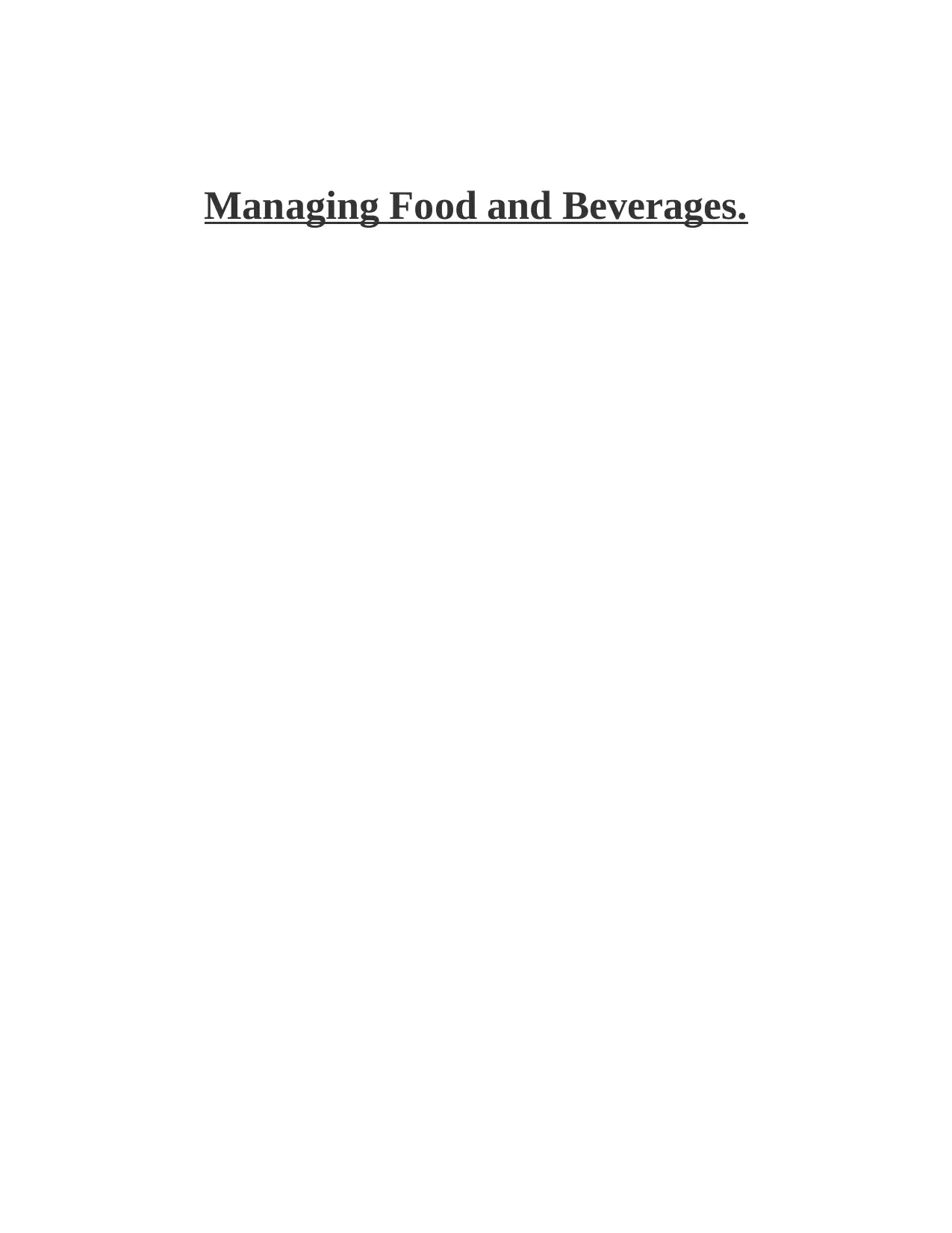
Managing Food and Beverages.
Paraphrase This Document
Need a fresh take? Get an instant paraphrase of this document with our AI Paraphraser
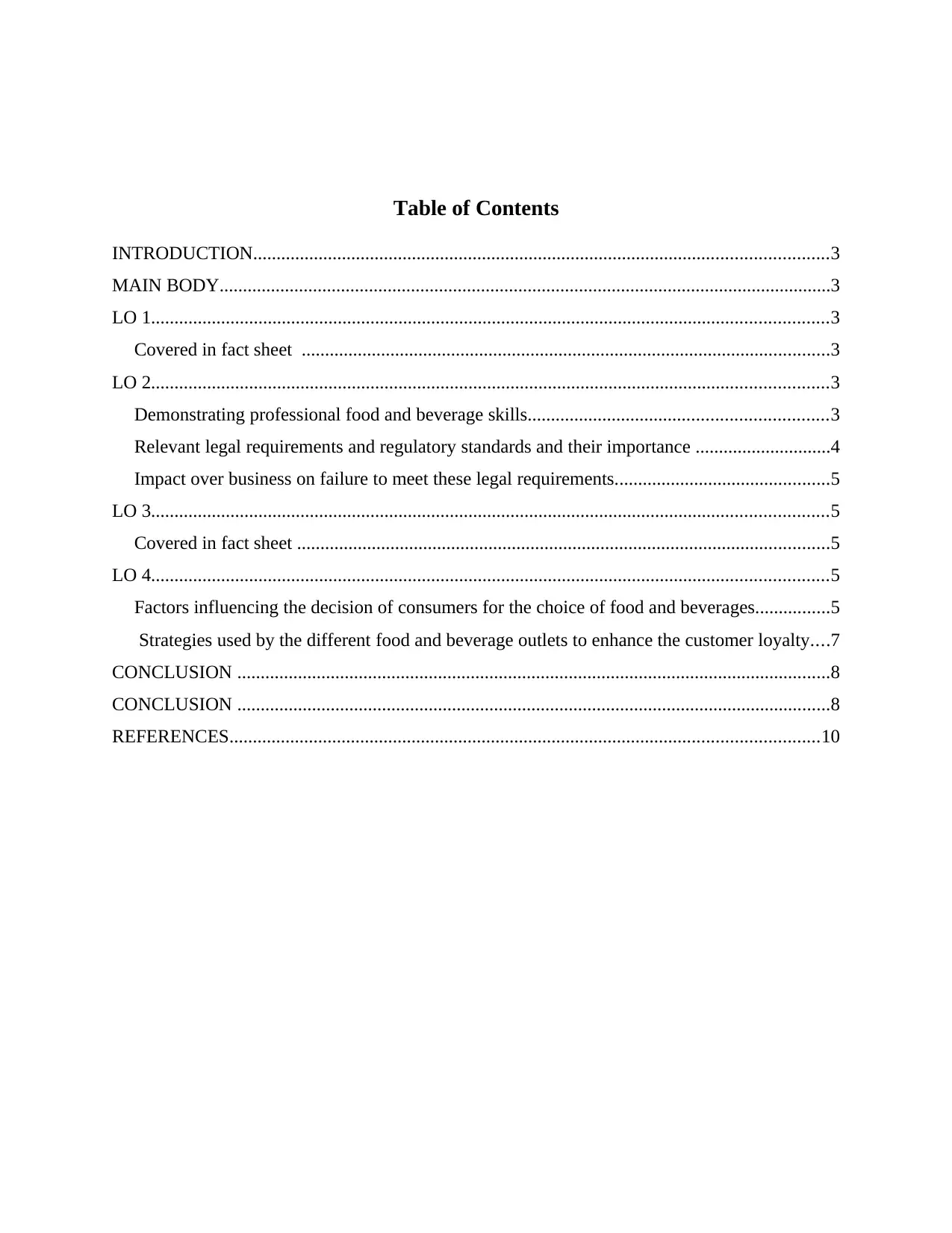
Table of Contents
INTRODUCTION...........................................................................................................................3
MAIN BODY...................................................................................................................................3
LO 1.................................................................................................................................................3
Covered in fact sheet .................................................................................................................3
LO 2.................................................................................................................................................3
Demonstrating professional food and beverage skills................................................................3
Relevant legal requirements and regulatory standards and their importance .............................4
Impact over business on failure to meet these legal requirements..............................................5
LO 3.................................................................................................................................................5
Covered in fact sheet ..................................................................................................................5
LO 4.................................................................................................................................................5
Factors influencing the decision of consumers for the choice of food and beverages................5
Strategies used by the different food and beverage outlets to enhance the customer loyalty....7
CONCLUSION ...............................................................................................................................8
CONCLUSION ...............................................................................................................................8
REFERENCES..............................................................................................................................10
INTRODUCTION...........................................................................................................................3
MAIN BODY...................................................................................................................................3
LO 1.................................................................................................................................................3
Covered in fact sheet .................................................................................................................3
LO 2.................................................................................................................................................3
Demonstrating professional food and beverage skills................................................................3
Relevant legal requirements and regulatory standards and their importance .............................4
Impact over business on failure to meet these legal requirements..............................................5
LO 3.................................................................................................................................................5
Covered in fact sheet ..................................................................................................................5
LO 4.................................................................................................................................................5
Factors influencing the decision of consumers for the choice of food and beverages................5
Strategies used by the different food and beverage outlets to enhance the customer loyalty....7
CONCLUSION ...............................................................................................................................8
CONCLUSION ...............................................................................................................................8
REFERENCES..............................................................................................................................10
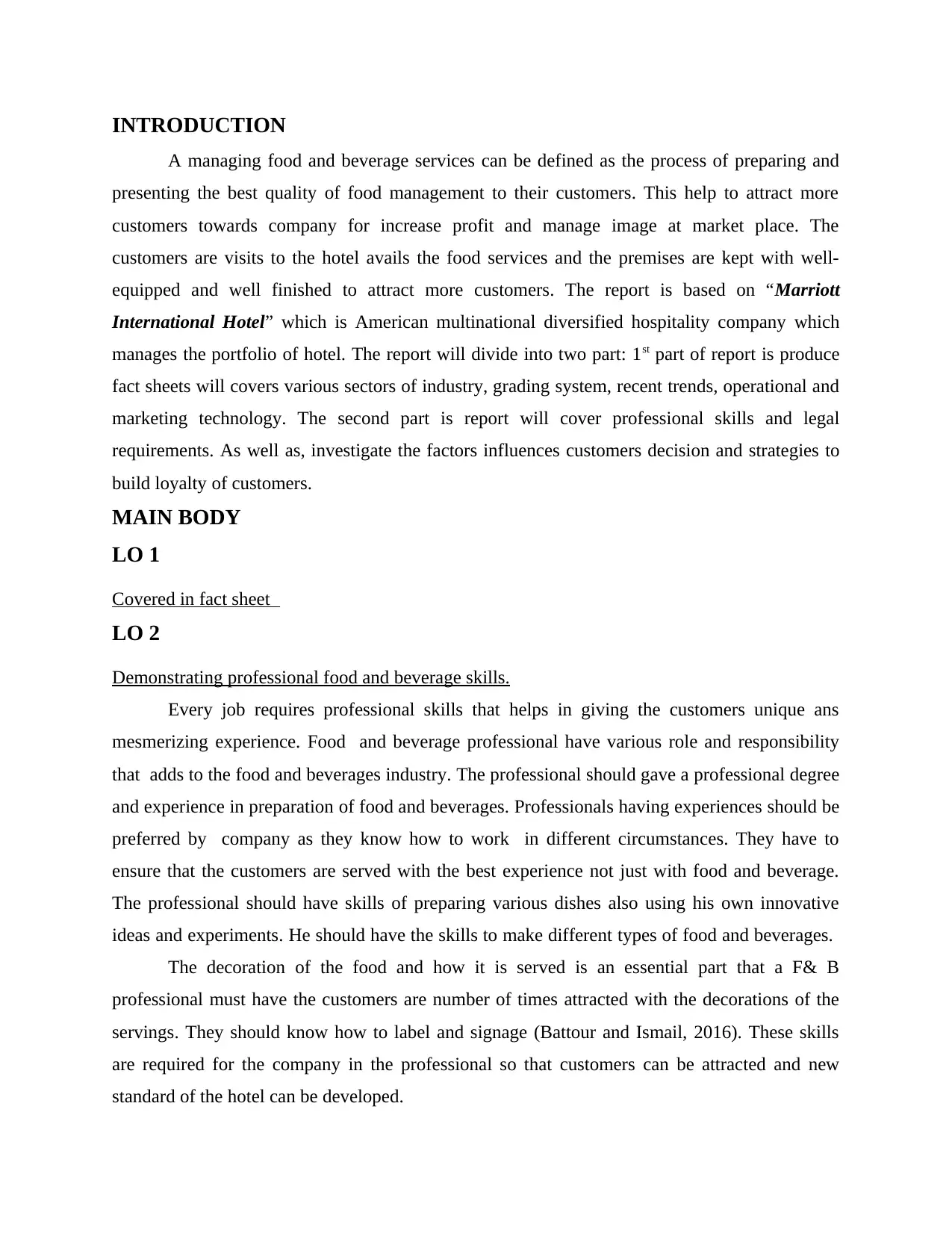
INTRODUCTION
A managing food and beverage services can be defined as the process of preparing and
presenting the best quality of food management to their customers. This help to attract more
customers towards company for increase profit and manage image at market place. The
customers are visits to the hotel avails the food services and the premises are kept with well-
equipped and well finished to attract more customers. The report is based on “Marriott
International Hotel” which is American multinational diversified hospitality company which
manages the portfolio of hotel. The report will divide into two part: 1st part of report is produce
fact sheets will covers various sectors of industry, grading system, recent trends, operational and
marketing technology. The second part is report will cover professional skills and legal
requirements. As well as, investigate the factors influences customers decision and strategies to
build loyalty of customers.
MAIN BODY
LO 1
Covered in fact sheet
LO 2
Demonstrating professional food and beverage skills.
Every job requires professional skills that helps in giving the customers unique ans
mesmerizing experience. Food and beverage professional have various role and responsibility
that adds to the food and beverages industry. The professional should gave a professional degree
and experience in preparation of food and beverages. Professionals having experiences should be
preferred by company as they know how to work in different circumstances. They have to
ensure that the customers are served with the best experience not just with food and beverage.
The professional should have skills of preparing various dishes also using his own innovative
ideas and experiments. He should have the skills to make different types of food and beverages.
The decoration of the food and how it is served is an essential part that a F& B
professional must have the customers are number of times attracted with the decorations of the
servings. They should know how to label and signage (Battour and Ismail, 2016). These skills
are required for the company in the professional so that customers can be attracted and new
standard of the hotel can be developed.
A managing food and beverage services can be defined as the process of preparing and
presenting the best quality of food management to their customers. This help to attract more
customers towards company for increase profit and manage image at market place. The
customers are visits to the hotel avails the food services and the premises are kept with well-
equipped and well finished to attract more customers. The report is based on “Marriott
International Hotel” which is American multinational diversified hospitality company which
manages the portfolio of hotel. The report will divide into two part: 1st part of report is produce
fact sheets will covers various sectors of industry, grading system, recent trends, operational and
marketing technology. The second part is report will cover professional skills and legal
requirements. As well as, investigate the factors influences customers decision and strategies to
build loyalty of customers.
MAIN BODY
LO 1
Covered in fact sheet
LO 2
Demonstrating professional food and beverage skills.
Every job requires professional skills that helps in giving the customers unique ans
mesmerizing experience. Food and beverage professional have various role and responsibility
that adds to the food and beverages industry. The professional should gave a professional degree
and experience in preparation of food and beverages. Professionals having experiences should be
preferred by company as they know how to work in different circumstances. They have to
ensure that the customers are served with the best experience not just with food and beverage.
The professional should have skills of preparing various dishes also using his own innovative
ideas and experiments. He should have the skills to make different types of food and beverages.
The decoration of the food and how it is served is an essential part that a F& B
professional must have the customers are number of times attracted with the decorations of the
servings. They should know how to label and signage (Battour and Ismail, 2016). These skills
are required for the company in the professional so that customers can be attracted and new
standard of the hotel can be developed.
⊘ This is a preview!⊘
Do you want full access?
Subscribe today to unlock all pages.

Trusted by 1+ million students worldwide
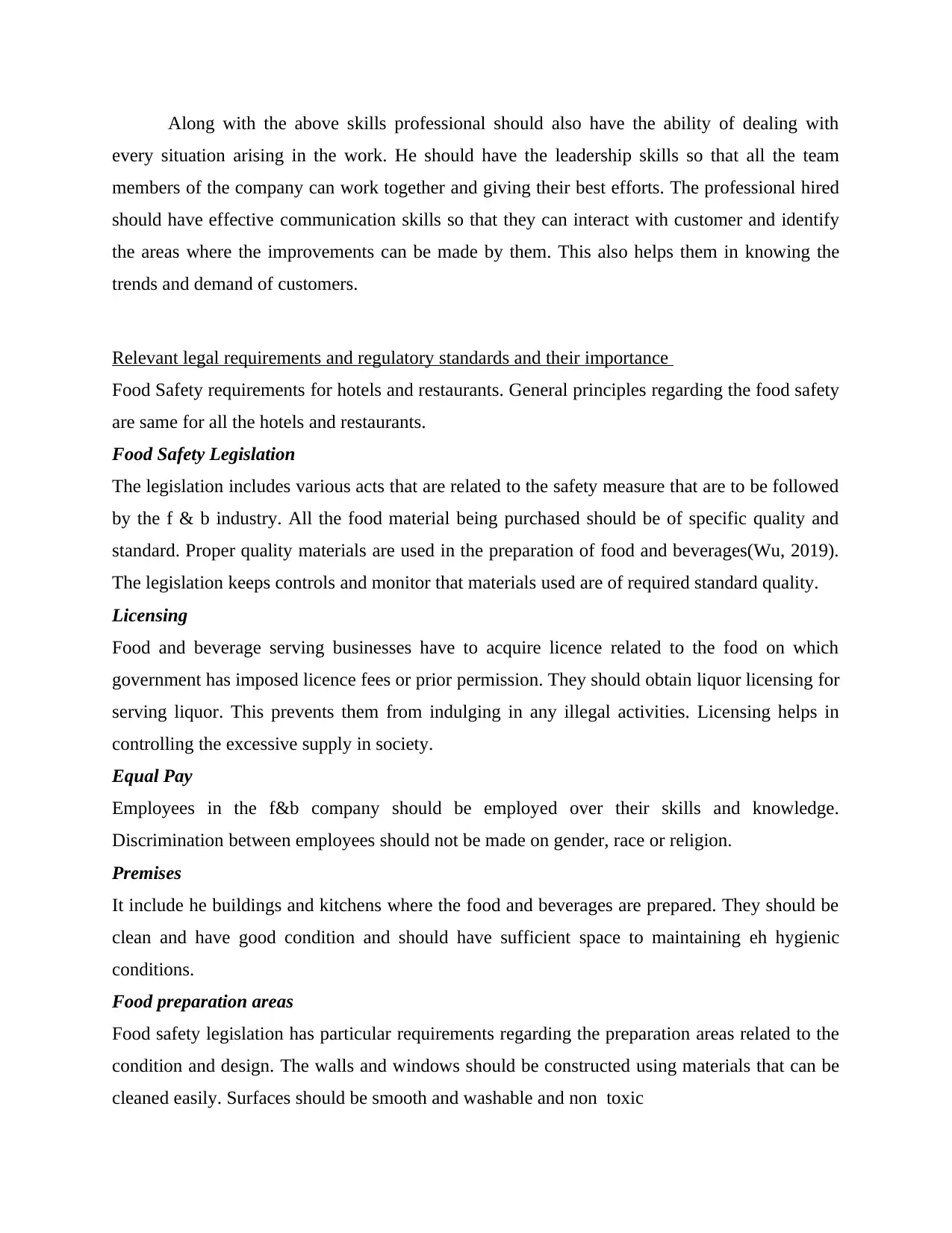
Along with the above skills professional should also have the ability of dealing with
every situation arising in the work. He should have the leadership skills so that all the team
members of the company can work together and giving their best efforts. The professional hired
should have effective communication skills so that they can interact with customer and identify
the areas where the improvements can be made by them. This also helps them in knowing the
trends and demand of customers.
Relevant legal requirements and regulatory standards and their importance
Food Safety requirements for hotels and restaurants. General principles regarding the food safety
are same for all the hotels and restaurants.
Food Safety Legislation
The legislation includes various acts that are related to the safety measure that are to be followed
by the f & b industry. All the food material being purchased should be of specific quality and
standard. Proper quality materials are used in the preparation of food and beverages(Wu, 2019).
The legislation keeps controls and monitor that materials used are of required standard quality.
Licensing
Food and beverage serving businesses have to acquire licence related to the food on which
government has imposed licence fees or prior permission. They should obtain liquor licensing for
serving liquor. This prevents them from indulging in any illegal activities. Licensing helps in
controlling the excessive supply in society.
Equal Pay
Employees in the f&b company should be employed over their skills and knowledge.
Discrimination between employees should not be made on gender, race or religion.
Premises
It include he buildings and kitchens where the food and beverages are prepared. They should be
clean and have good condition and should have sufficient space to maintaining eh hygienic
conditions.
Food preparation areas
Food safety legislation has particular requirements regarding the preparation areas related to the
condition and design. The walls and windows should be constructed using materials that can be
cleaned easily. Surfaces should be smooth and washable and non toxic
every situation arising in the work. He should have the leadership skills so that all the team
members of the company can work together and giving their best efforts. The professional hired
should have effective communication skills so that they can interact with customer and identify
the areas where the improvements can be made by them. This also helps them in knowing the
trends and demand of customers.
Relevant legal requirements and regulatory standards and their importance
Food Safety requirements for hotels and restaurants. General principles regarding the food safety
are same for all the hotels and restaurants.
Food Safety Legislation
The legislation includes various acts that are related to the safety measure that are to be followed
by the f & b industry. All the food material being purchased should be of specific quality and
standard. Proper quality materials are used in the preparation of food and beverages(Wu, 2019).
The legislation keeps controls and monitor that materials used are of required standard quality.
Licensing
Food and beverage serving businesses have to acquire licence related to the food on which
government has imposed licence fees or prior permission. They should obtain liquor licensing for
serving liquor. This prevents them from indulging in any illegal activities. Licensing helps in
controlling the excessive supply in society.
Equal Pay
Employees in the f&b company should be employed over their skills and knowledge.
Discrimination between employees should not be made on gender, race or religion.
Premises
It include he buildings and kitchens where the food and beverages are prepared. They should be
clean and have good condition and should have sufficient space to maintaining eh hygienic
conditions.
Food preparation areas
Food safety legislation has particular requirements regarding the preparation areas related to the
condition and design. The walls and windows should be constructed using materials that can be
cleaned easily. Surfaces should be smooth and washable and non toxic
Paraphrase This Document
Need a fresh take? Get an instant paraphrase of this document with our AI Paraphraser
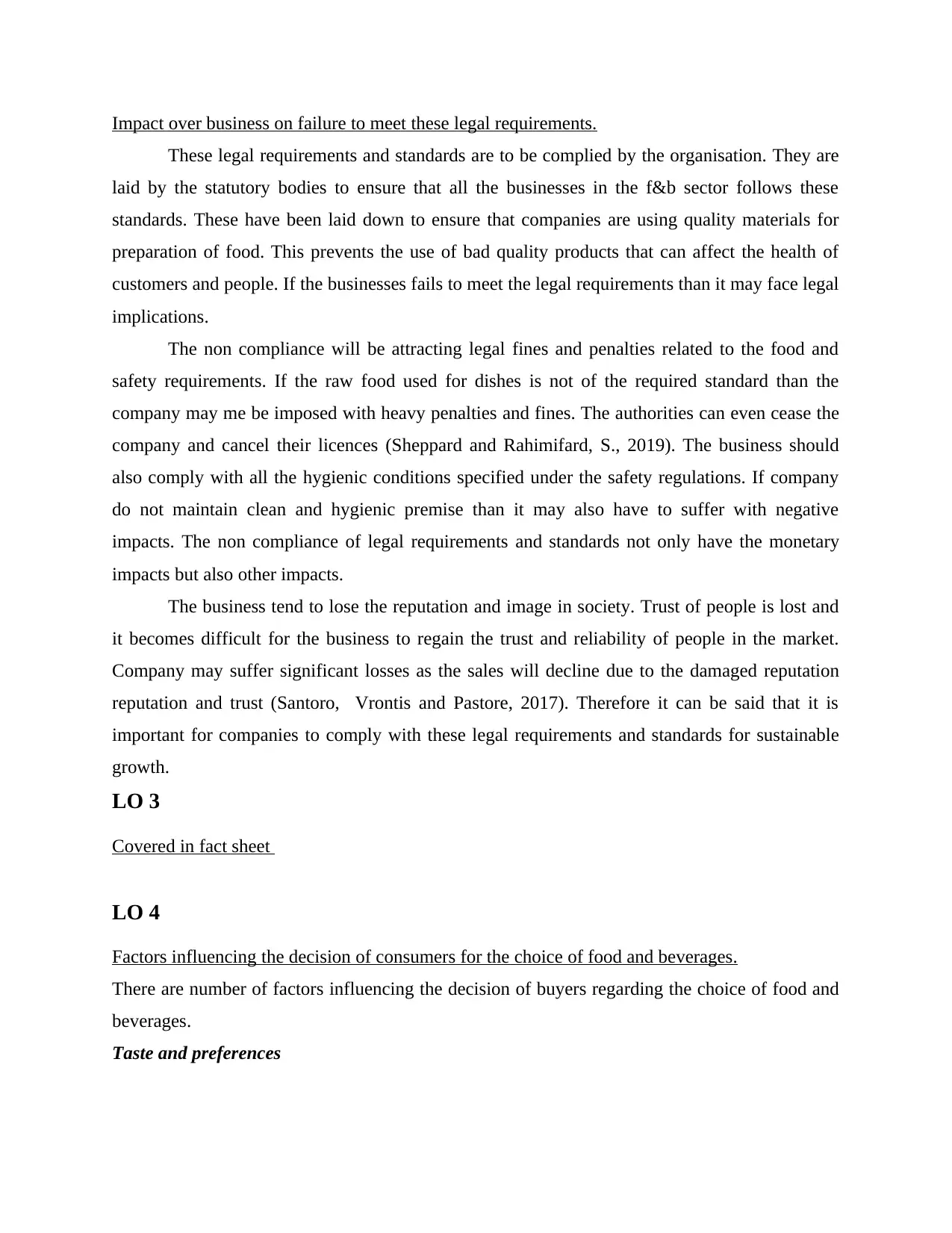
Impact over business on failure to meet these legal requirements.
These legal requirements and standards are to be complied by the organisation. They are
laid by the statutory bodies to ensure that all the businesses in the f&b sector follows these
standards. These have been laid down to ensure that companies are using quality materials for
preparation of food. This prevents the use of bad quality products that can affect the health of
customers and people. If the businesses fails to meet the legal requirements than it may face legal
implications.
The non compliance will be attracting legal fines and penalties related to the food and
safety requirements. If the raw food used for dishes is not of the required standard than the
company may me be imposed with heavy penalties and fines. The authorities can even cease the
company and cancel their licences (Sheppard and Rahimifard, S., 2019). The business should
also comply with all the hygienic conditions specified under the safety regulations. If company
do not maintain clean and hygienic premise than it may also have to suffer with negative
impacts. The non compliance of legal requirements and standards not only have the monetary
impacts but also other impacts.
The business tend to lose the reputation and image in society. Trust of people is lost and
it becomes difficult for the business to regain the trust and reliability of people in the market.
Company may suffer significant losses as the sales will decline due to the damaged reputation
reputation and trust (Santoro, Vrontis and Pastore, 2017). Therefore it can be said that it is
important for companies to comply with these legal requirements and standards for sustainable
growth.
LO 3
Covered in fact sheet
LO 4
Factors influencing the decision of consumers for the choice of food and beverages.
There are number of factors influencing the decision of buyers regarding the choice of food and
beverages.
Taste and preferences
These legal requirements and standards are to be complied by the organisation. They are
laid by the statutory bodies to ensure that all the businesses in the f&b sector follows these
standards. These have been laid down to ensure that companies are using quality materials for
preparation of food. This prevents the use of bad quality products that can affect the health of
customers and people. If the businesses fails to meet the legal requirements than it may face legal
implications.
The non compliance will be attracting legal fines and penalties related to the food and
safety requirements. If the raw food used for dishes is not of the required standard than the
company may me be imposed with heavy penalties and fines. The authorities can even cease the
company and cancel their licences (Sheppard and Rahimifard, S., 2019). The business should
also comply with all the hygienic conditions specified under the safety regulations. If company
do not maintain clean and hygienic premise than it may also have to suffer with negative
impacts. The non compliance of legal requirements and standards not only have the monetary
impacts but also other impacts.
The business tend to lose the reputation and image in society. Trust of people is lost and
it becomes difficult for the business to regain the trust and reliability of people in the market.
Company may suffer significant losses as the sales will decline due to the damaged reputation
reputation and trust (Santoro, Vrontis and Pastore, 2017). Therefore it can be said that it is
important for companies to comply with these legal requirements and standards for sustainable
growth.
LO 3
Covered in fact sheet
LO 4
Factors influencing the decision of consumers for the choice of food and beverages.
There are number of factors influencing the decision of buyers regarding the choice of food and
beverages.
Taste and preferences
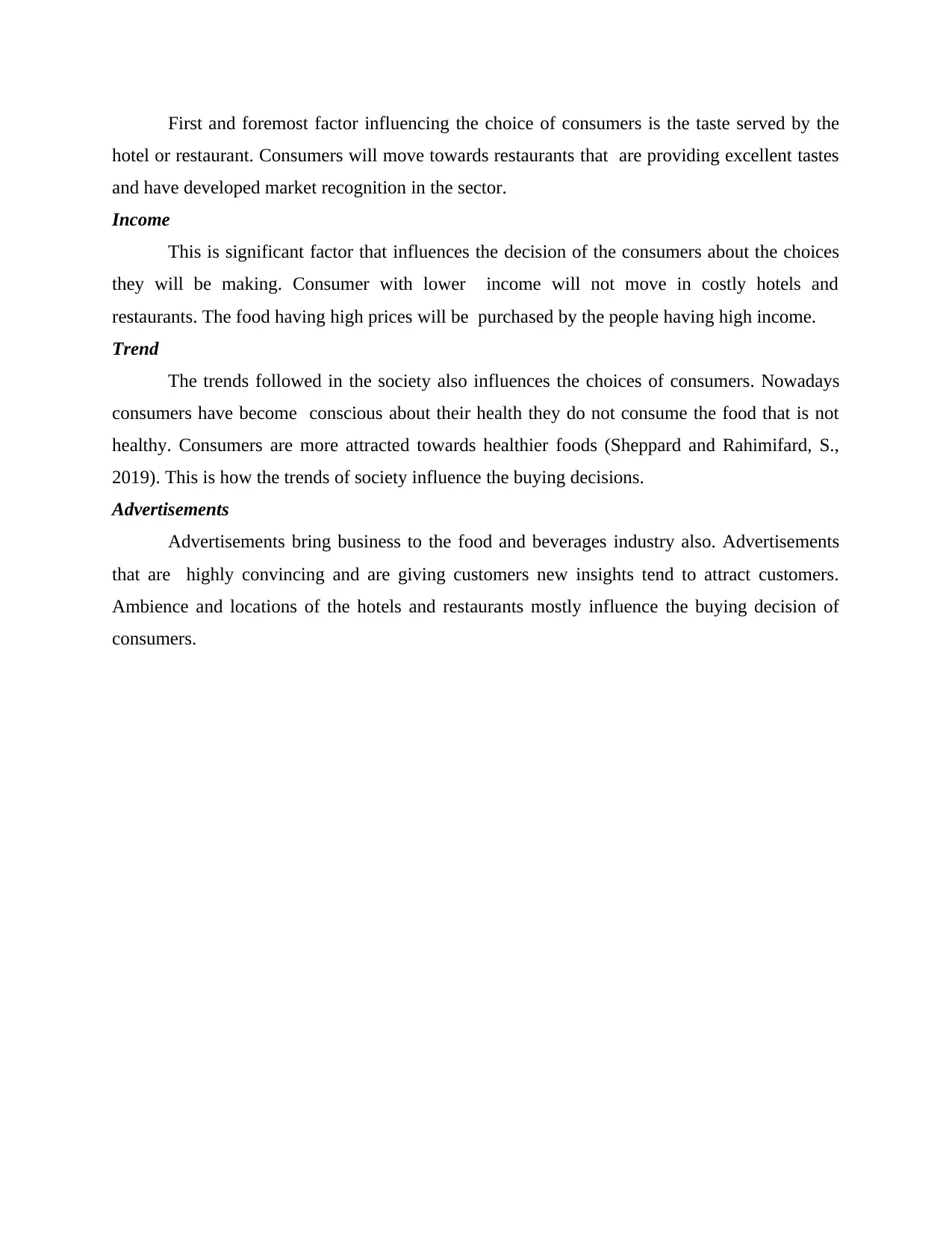
First and foremost factor influencing the choice of consumers is the taste served by the
hotel or restaurant. Consumers will move towards restaurants that are providing excellent tastes
and have developed market recognition in the sector.
Income
This is significant factor that influences the decision of the consumers about the choices
they will be making. Consumer with lower income will not move in costly hotels and
restaurants. The food having high prices will be purchased by the people having high income.
Trend
The trends followed in the society also influences the choices of consumers. Nowadays
consumers have become conscious about their health they do not consume the food that is not
healthy. Consumers are more attracted towards healthier foods (Sheppard and Rahimifard, S.,
2019). This is how the trends of society influence the buying decisions.
Advertisements
Advertisements bring business to the food and beverages industry also. Advertisements
that are highly convincing and are giving customers new insights tend to attract customers.
Ambience and locations of the hotels and restaurants mostly influence the buying decision of
consumers.
hotel or restaurant. Consumers will move towards restaurants that are providing excellent tastes
and have developed market recognition in the sector.
Income
This is significant factor that influences the decision of the consumers about the choices
they will be making. Consumer with lower income will not move in costly hotels and
restaurants. The food having high prices will be purchased by the people having high income.
Trend
The trends followed in the society also influences the choices of consumers. Nowadays
consumers have become conscious about their health they do not consume the food that is not
healthy. Consumers are more attracted towards healthier foods (Sheppard and Rahimifard, S.,
2019). This is how the trends of society influence the buying decisions.
Advertisements
Advertisements bring business to the food and beverages industry also. Advertisements
that are highly convincing and are giving customers new insights tend to attract customers.
Ambience and locations of the hotels and restaurants mostly influence the buying decision of
consumers.
⊘ This is a preview!⊘
Do you want full access?
Subscribe today to unlock all pages.

Trusted by 1+ million students worldwide
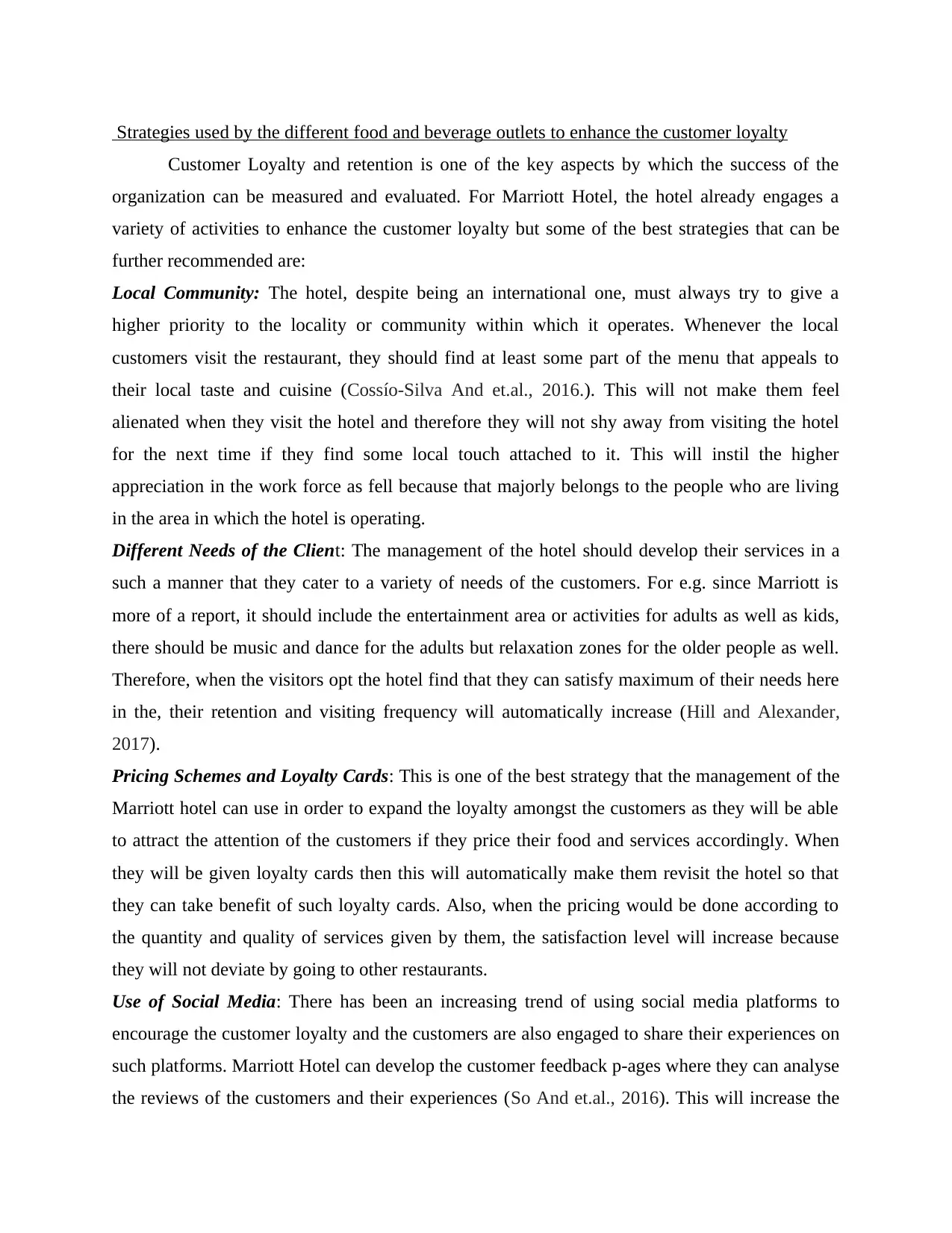
Strategies used by the different food and beverage outlets to enhance the customer loyalty
Customer Loyalty and retention is one of the key aspects by which the success of the
organization can be measured and evaluated. For Marriott Hotel, the hotel already engages a
variety of activities to enhance the customer loyalty but some of the best strategies that can be
further recommended are:
Local Community: The hotel, despite being an international one, must always try to give a
higher priority to the locality or community within which it operates. Whenever the local
customers visit the restaurant, they should find at least some part of the menu that appeals to
their local taste and cuisine (Cossío-Silva And et.al., 2016.). This will not make them feel
alienated when they visit the hotel and therefore they will not shy away from visiting the hotel
for the next time if they find some local touch attached to it. This will instil the higher
appreciation in the work force as fell because that majorly belongs to the people who are living
in the area in which the hotel is operating.
Different Needs of the Client: The management of the hotel should develop their services in a
such a manner that they cater to a variety of needs of the customers. For e.g. since Marriott is
more of a report, it should include the entertainment area or activities for adults as well as kids,
there should be music and dance for the adults but relaxation zones for the older people as well.
Therefore, when the visitors opt the hotel find that they can satisfy maximum of their needs here
in the, their retention and visiting frequency will automatically increase (Hill and Alexander,
2017).
Pricing Schemes and Loyalty Cards: This is one of the best strategy that the management of the
Marriott hotel can use in order to expand the loyalty amongst the customers as they will be able
to attract the attention of the customers if they price their food and services accordingly. When
they will be given loyalty cards then this will automatically make them revisit the hotel so that
they can take benefit of such loyalty cards. Also, when the pricing would be done according to
the quantity and quality of services given by them, the satisfaction level will increase because
they will not deviate by going to other restaurants.
Use of Social Media: There has been an increasing trend of using social media platforms to
encourage the customer loyalty and the customers are also engaged to share their experiences on
such platforms. Marriott Hotel can develop the customer feedback p-ages where they can analyse
the reviews of the customers and their experiences (So And et.al., 2016). This will increase the
Customer Loyalty and retention is one of the key aspects by which the success of the
organization can be measured and evaluated. For Marriott Hotel, the hotel already engages a
variety of activities to enhance the customer loyalty but some of the best strategies that can be
further recommended are:
Local Community: The hotel, despite being an international one, must always try to give a
higher priority to the locality or community within which it operates. Whenever the local
customers visit the restaurant, they should find at least some part of the menu that appeals to
their local taste and cuisine (Cossío-Silva And et.al., 2016.). This will not make them feel
alienated when they visit the hotel and therefore they will not shy away from visiting the hotel
for the next time if they find some local touch attached to it. This will instil the higher
appreciation in the work force as fell because that majorly belongs to the people who are living
in the area in which the hotel is operating.
Different Needs of the Client: The management of the hotel should develop their services in a
such a manner that they cater to a variety of needs of the customers. For e.g. since Marriott is
more of a report, it should include the entertainment area or activities for adults as well as kids,
there should be music and dance for the adults but relaxation zones for the older people as well.
Therefore, when the visitors opt the hotel find that they can satisfy maximum of their needs here
in the, their retention and visiting frequency will automatically increase (Hill and Alexander,
2017).
Pricing Schemes and Loyalty Cards: This is one of the best strategy that the management of the
Marriott hotel can use in order to expand the loyalty amongst the customers as they will be able
to attract the attention of the customers if they price their food and services accordingly. When
they will be given loyalty cards then this will automatically make them revisit the hotel so that
they can take benefit of such loyalty cards. Also, when the pricing would be done according to
the quantity and quality of services given by them, the satisfaction level will increase because
they will not deviate by going to other restaurants.
Use of Social Media: There has been an increasing trend of using social media platforms to
encourage the customer loyalty and the customers are also engaged to share their experiences on
such platforms. Marriott Hotel can develop the customer feedback p-ages where they can analyse
the reviews of the customers and their experiences (So And et.al., 2016). This will increase the
Paraphrase This Document
Need a fresh take? Get an instant paraphrase of this document with our AI Paraphraser
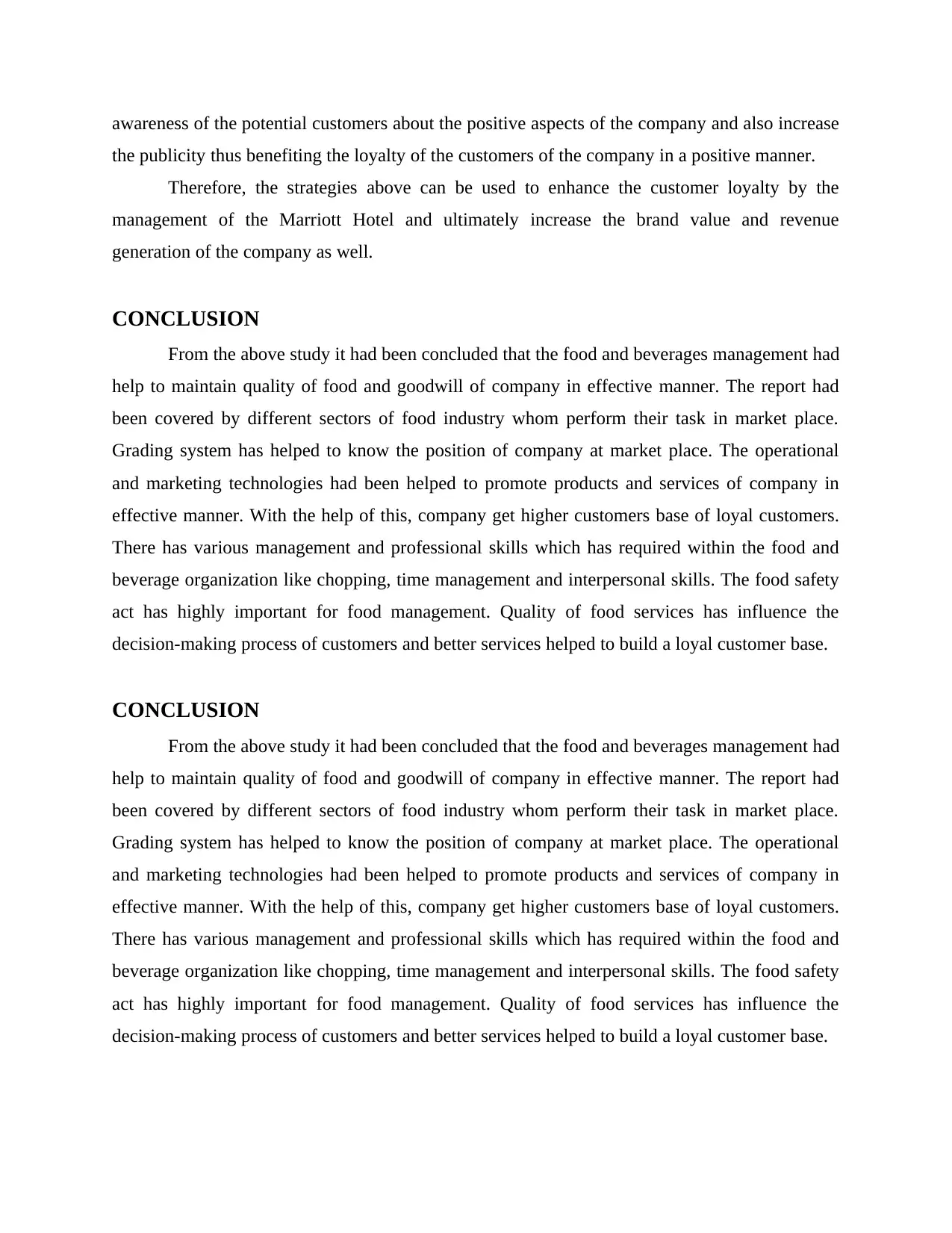
awareness of the potential customers about the positive aspects of the company and also increase
the publicity thus benefiting the loyalty of the customers of the company in a positive manner.
Therefore, the strategies above can be used to enhance the customer loyalty by the
management of the Marriott Hotel and ultimately increase the brand value and revenue
generation of the company as well.
CONCLUSION
From the above study it had been concluded that the food and beverages management had
help to maintain quality of food and goodwill of company in effective manner. The report had
been covered by different sectors of food industry whom perform their task in market place.
Grading system has helped to know the position of company at market place. The operational
and marketing technologies had been helped to promote products and services of company in
effective manner. With the help of this, company get higher customers base of loyal customers.
There has various management and professional skills which has required within the food and
beverage organization like chopping, time management and interpersonal skills. The food safety
act has highly important for food management. Quality of food services has influence the
decision-making process of customers and better services helped to build a loyal customer base.
CONCLUSION
From the above study it had been concluded that the food and beverages management had
help to maintain quality of food and goodwill of company in effective manner. The report had
been covered by different sectors of food industry whom perform their task in market place.
Grading system has helped to know the position of company at market place. The operational
and marketing technologies had been helped to promote products and services of company in
effective manner. With the help of this, company get higher customers base of loyal customers.
There has various management and professional skills which has required within the food and
beverage organization like chopping, time management and interpersonal skills. The food safety
act has highly important for food management. Quality of food services has influence the
decision-making process of customers and better services helped to build a loyal customer base.
the publicity thus benefiting the loyalty of the customers of the company in a positive manner.
Therefore, the strategies above can be used to enhance the customer loyalty by the
management of the Marriott Hotel and ultimately increase the brand value and revenue
generation of the company as well.
CONCLUSION
From the above study it had been concluded that the food and beverages management had
help to maintain quality of food and goodwill of company in effective manner. The report had
been covered by different sectors of food industry whom perform their task in market place.
Grading system has helped to know the position of company at market place. The operational
and marketing technologies had been helped to promote products and services of company in
effective manner. With the help of this, company get higher customers base of loyal customers.
There has various management and professional skills which has required within the food and
beverage organization like chopping, time management and interpersonal skills. The food safety
act has highly important for food management. Quality of food services has influence the
decision-making process of customers and better services helped to build a loyal customer base.
CONCLUSION
From the above study it had been concluded that the food and beverages management had
help to maintain quality of food and goodwill of company in effective manner. The report had
been covered by different sectors of food industry whom perform their task in market place.
Grading system has helped to know the position of company at market place. The operational
and marketing technologies had been helped to promote products and services of company in
effective manner. With the help of this, company get higher customers base of loyal customers.
There has various management and professional skills which has required within the food and
beverage organization like chopping, time management and interpersonal skills. The food safety
act has highly important for food management. Quality of food services has influence the
decision-making process of customers and better services helped to build a loyal customer base.

⊘ This is a preview!⊘
Do you want full access?
Subscribe today to unlock all pages.

Trusted by 1+ million students worldwide
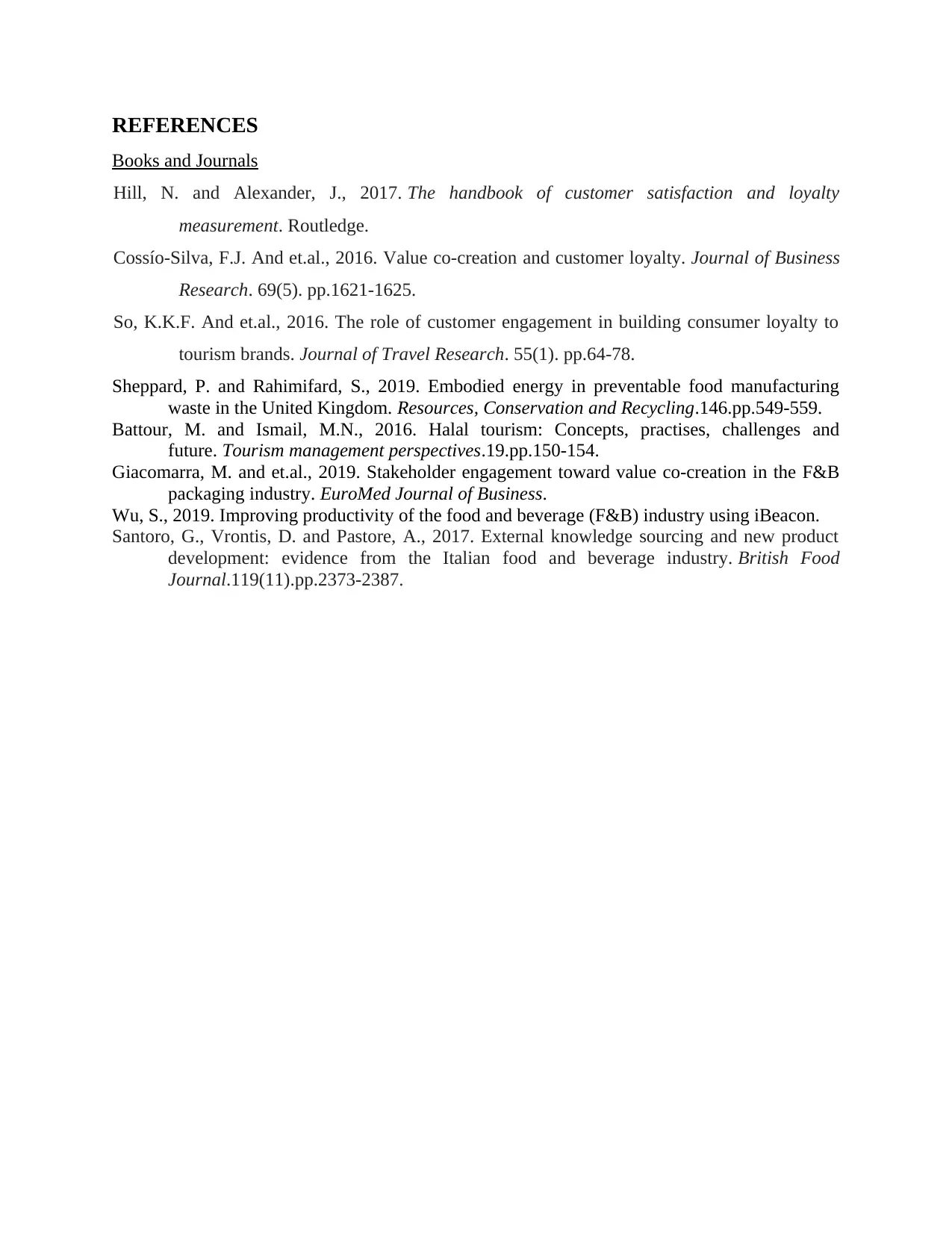
REFERENCES
Books and Journals
Hill, N. and Alexander, J., 2017. The handbook of customer satisfaction and loyalty
measurement. Routledge.
Cossío-Silva, F.J. And et.al., 2016. Value co-creation and customer loyalty. Journal of Business
Research. 69(5). pp.1621-1625.
So, K.K.F. And et.al., 2016. The role of customer engagement in building consumer loyalty to
tourism brands. Journal of Travel Research. 55(1). pp.64-78.
Sheppard, P. and Rahimifard, S., 2019. Embodied energy in preventable food manufacturing
waste in the United Kingdom. Resources, Conservation and Recycling.146.pp.549-559.
Battour, M. and Ismail, M.N., 2016. Halal tourism: Concepts, practises, challenges and
future. Tourism management perspectives.19.pp.150-154.
Giacomarra, M. and et.al., 2019. Stakeholder engagement toward value co-creation in the F&B
packaging industry. EuroMed Journal of Business.
Wu, S., 2019. Improving productivity of the food and beverage (F&B) industry using iBeacon.
Santoro, G., Vrontis, D. and Pastore, A., 2017. External knowledge sourcing and new product
development: evidence from the Italian food and beverage industry. British Food
Journal.119(11).pp.2373-2387.
Books and Journals
Hill, N. and Alexander, J., 2017. The handbook of customer satisfaction and loyalty
measurement. Routledge.
Cossío-Silva, F.J. And et.al., 2016. Value co-creation and customer loyalty. Journal of Business
Research. 69(5). pp.1621-1625.
So, K.K.F. And et.al., 2016. The role of customer engagement in building consumer loyalty to
tourism brands. Journal of Travel Research. 55(1). pp.64-78.
Sheppard, P. and Rahimifard, S., 2019. Embodied energy in preventable food manufacturing
waste in the United Kingdom. Resources, Conservation and Recycling.146.pp.549-559.
Battour, M. and Ismail, M.N., 2016. Halal tourism: Concepts, practises, challenges and
future. Tourism management perspectives.19.pp.150-154.
Giacomarra, M. and et.al., 2019. Stakeholder engagement toward value co-creation in the F&B
packaging industry. EuroMed Journal of Business.
Wu, S., 2019. Improving productivity of the food and beverage (F&B) industry using iBeacon.
Santoro, G., Vrontis, D. and Pastore, A., 2017. External knowledge sourcing and new product
development: evidence from the Italian food and beverage industry. British Food
Journal.119(11).pp.2373-2387.
1 out of 10
Related Documents
Your All-in-One AI-Powered Toolkit for Academic Success.
+13062052269
info@desklib.com
Available 24*7 on WhatsApp / Email
![[object Object]](/_next/static/media/star-bottom.7253800d.svg)
Unlock your academic potential
Copyright © 2020–2026 A2Z Services. All Rights Reserved. Developed and managed by ZUCOL.





